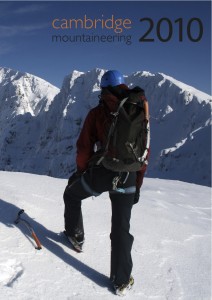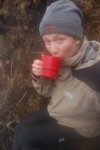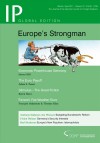 Visitors to Madrid soon learn about Spain’s glorious long lunches, from the cozy cocido soup to hefty heaps of saffron-laced meatballs. They may even make the connection, through the haze of a food coma, between the country’s midday meals and its notorious siestas, often blamed for Spain’s sleepy economy. But for Madrileños, a good lunch is about more than escape from work or filling bellies. For older Madrileños, lunch, called la comida, or “the food,” is a time to luxuriate in la familia. But tugged one way by their traditions and another by their rising ambitions, many Spanish families are leaving the table empty at lunch.
Visitors to Madrid soon learn about Spain’s glorious long lunches, from the cozy cocido soup to hefty heaps of saffron-laced meatballs. They may even make the connection, through the haze of a food coma, between the country’s midday meals and its notorious siestas, often blamed for Spain’s sleepy economy. But for Madrileños, a good lunch is about more than escape from work or filling bellies. For older Madrileños, lunch, called la comida, or “the food,” is a time to luxuriate in la familia. But tugged one way by their traditions and another by their rising ambitions, many Spanish families are leaving the table empty at lunch.
Last week burnt-out trash bins in the street, together with the latest figures from the National Institute of Statistics (INE), attested to the growing wedge between generations in Spain. It’s no secret that the worst damage to the country’s economy has been to its youth: the INE lists around 80,000 new jobs in the last quarter of 2010 among those aged over 35, but 217,000 fewer jobs for workers aged 16-34. National unemployment is just over 20 percent, but for those under age 25, it’s over 40 percent. Contracts for the young tend to be short-term or part-time. So when Spain’s grandparent class, in the form of union leaders and government negotiators, agreed at the end of January that the next generations will have to contribute more to the national pension plan, some young Spaniards hit the streets.
Police blocked a march to the Senate, so protestors trashed Tirso de Molina, a cheerful plaza whose graceful curved street lamps overlook terrace cafes. They lit trash containers on fire, blocking an intersection, and hurled bricks at bank windows. It’s possible that a father and a son could have broken bread that night, wearing shoes covered in dust from opposite sides of the same scuffle, one a pair of loafers worn to work at the bank and the other a pair of steel-toed boots kept from a briefly-held construction job.
Other young Spaniards vote with their feet. Equipped with more training than their parents but facing fewer opportunities, these recent graduates chase jobs abroad. One of my Madrileño cousins just got an internship in Santiago, Chile, a first post-graduate stop that he figures will be more of a jumping-off point than a high point. His father, in contrast, lives in a leafy neighborhood near the Retiro park and continues to take Sunday lunch with his wife and childhood friends, who all grew up nearby. My cousin won’t be appearing at that lunch table anytime soon, though.
The loss of our family lunches is uncomfortable, but I suspect it’s also part of an irreversible trend across Spain, whether the economy continues to stumble along or picks up pace. Young Spaniards have had a taste of the good life, whether that means ditching the fields of Andalusia for a bartending job in Valencia or earning an MBA in Milan and joining an internet firm in Seattle. Maybe part of the problem is that when their parents tasted the good life, they held on—securing well-protected employment contracts and mortgages in their hometowns, and leaving little room for another ambitious generation.
Another cousin, pushing 30, lives under his parent’s roof—in a second apartment they’ve bought in the same building. The kitchen of his gilded cage is pristine: he still nips upstairs for meals with his folks. He’s employed full-time by means of cobbling together part-time, fixed-term contracts. I once asked him whether he was angry at his parent’s generation for grabbing such a disproportionate share of Spain’s economy. He looked at me, mystified. He may still have a few cozy meals at home ahead of him.
Of course, nobody forces Spaniards to emigrate or commute—they are driven by a combination of education and narrower professional interests and enabled by the lower barriers to travel that have flattened Europe’s labor landscape in the last couple of decades. Again, examples from among my many cousins: one chose to pursue an obscure scientific field and found a matching research group in Newcastle. Yet another settled in Berlin with her Dutch boyfriend.
Mobility and prioritizing your profession are both revered where I grew up in southern California. There, people brag about having a “reverse-commute,” or driving against the main flow of traffic to and from work every day, as if driving a long distance to work every day is somehow commendable because others driving the same long distance to work every day are slower.
I still haven’t gotten anyone in Madrid to offer me a suitable translation for the word “commute.” But I fear that won’t last. More and more Madrileños know what I mean when I describe commuting because it’s what lets them afford a larger home on the outskirts of the city or to put their kids in a better school. That’s probably good for the country, but I wonder what it will mean for la comida and la familia.
See this essay in Internationale Politik – Global (now IP Journal) online [html] or as it appeared in print [pdf]
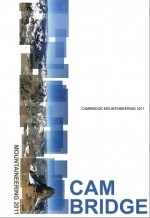 Messieurs Goldman and Davenport, in Switzerland for the McCombie nuptials, invited Ms Crockett and Mr Laursen to an attempt on the Jaegihorn, above Saas Grund in the Swiss Valais region. Goldman and Davenport charmed the hut mistress into providing extra victuals. With full bellies and a 4am start, Laursen led the team on a circular tour of a neighbouring moraine in a suspected effort to escape the climb.
Messieurs Goldman and Davenport, in Switzerland for the McCombie nuptials, invited Ms Crockett and Mr Laursen to an attempt on the Jaegihorn, above Saas Grund in the Swiss Valais region. Goldman and Davenport charmed the hut mistress into providing extra victuals. With full bellies and a 4am start, Laursen led the team on a circular tour of a neighbouring moraine in a suspected effort to escape the climb.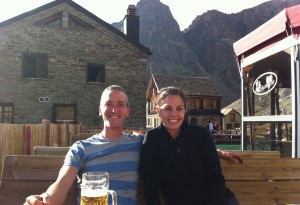 n rose, however, the team identified the start of the Alpendurst route and commenced climbing activities culminating in a successful summit. From here the evidence grows patchier. The two rope teams lost sight of one another. Subsequent reports from CUMC Zurich stationmaster Kavanaugh place Goldman and Davenport on a dance floor at a castle outside Basel ca. 3am. Davenport failed to report to the post-climb debriefing in Dietikon while Goldman reported to Dietlikon instead. Kavanaugh relieved all parties of their duties in disgust.
n rose, however, the team identified the start of the Alpendurst route and commenced climbing activities culminating in a successful summit. From here the evidence grows patchier. The two rope teams lost sight of one another. Subsequent reports from CUMC Zurich stationmaster Kavanaugh place Goldman and Davenport on a dance floor at a castle outside Basel ca. 3am. Davenport failed to report to the post-climb debriefing in Dietikon while Goldman reported to Dietlikon instead. Kavanaugh relieved all parties of their duties in disgust.



